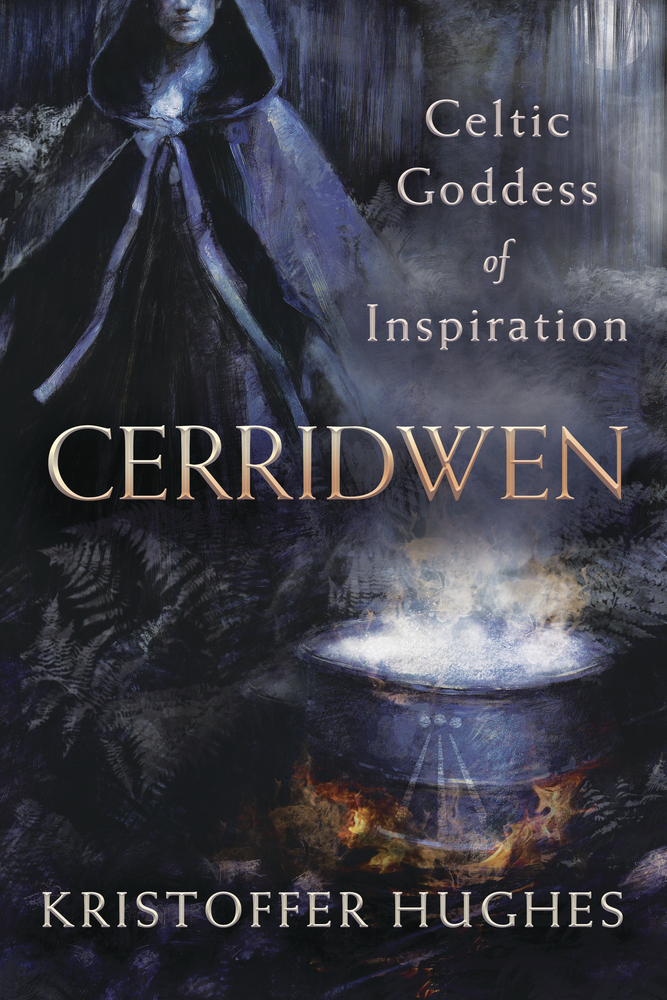
Using scholarly sources and his own experience, chief of the Anglesey Order of Druids Kristoffer Hughes takes the reader on a journey to explore the history of the Welsh Goddess Cerridwen. What emerges is probably the most definitive work on Cerridwen, that aims to provide both scholarly background and a practical guide to incorporating worship of Cerridwen into a pagan practice.
I have been waiting for this book for two years, ever since seeing Hughes’s presentation at Paganicon on Ceridwen. I’ll admit—I went to his topic because it sounded interesting but I had never heard of him before. However, his presentation was worth it to hear him quote from the poem “Chair of Cerridwen” and sum up the meaning as “My chair, bitch!” Hughes’s other books and Celtic Tarot are well worth checking out. (My rule of not reviewing anything by the same author for one year leads me to doubt I’ll be doing an official review of any of them.)
As a native Welsh speaker Hughes is able to dive deep into the Welsh bardic manuscripts and bring material to an English speaking audience. I was shocked to learn how much pagan material there is in the Christian medieval period. (Yes, the conversion was a lot more complicated than commonly believed.) Technically, Ceridwen is a figure respected from myth that became a goddess through a process known as apotheosis. The story of Ceridwen and Gwion Bach is a relatively late invention.
There is a lot of the Welsh language in this book. I’ll admit as someone who has failed miserably to learn Gaelic off and on that I do have to frequently skip to the pronunciation guide to remember that’s how you pronounce two ff in Welsh again. The author has a you tube channel with the Welsh words and poems found in the book. Language is such a part of a culture and the communication of beliefs and ideas that form the backbone of that culture, and is especially important for a Goddess who one of her functions—is, well, mastery of the use of language. This book could only be written by a native Welsh speaker, and for too often neo pagan traditions aren’t very connected to the modern peoples who they claim spiritual descent from.
Most pagan books specifically about a particular god are either devotional/memoir that include some ritual and have some scholarship to go in deep for that god. This book leans more on the scholarly end with rituals that I feel are more meant to be a starting point then hard or fast rules. This is a book more about introducing ideas and exploring them in detail then giving a rigid set of doctrine. I like Hughes’s down to earth attitude. We’re here now, we need to use what works now, instead of always being nostalgic for the past.
Spiritually, this comes at an important time for me, as I am exploring a relationship with Cerridwen. My experience so far is She gives blunt truths using poetic language that makes things clear instead of trying to obfuscate.
One thing missing from this book is a list of direct correspondences. Colors, days of the week, scents, etc. Although that begs the question what the traditional days of the week in Wales were. Cerridwen hasn’t been worshipped for a long period. Part of it is She seems to prefer offerings of creative work rather than food or alcohol.
I would recommend this book for an advanced beginner. Hughes does go through some basic rituals, but this is more for someone who already has a grounding in Celtic/Welsh theology and Druidry. For a newbie, I’d recommend reading one of his earlier books (Cauldron Born especially goes through the non Cerridwen aspects of Welsh myth) for an introduction to basic concepts.
This book brings together a lot of information on Cerridwen in one place. I recommend it for anyone interested in learning more about her and exploring a devotional relationship.
